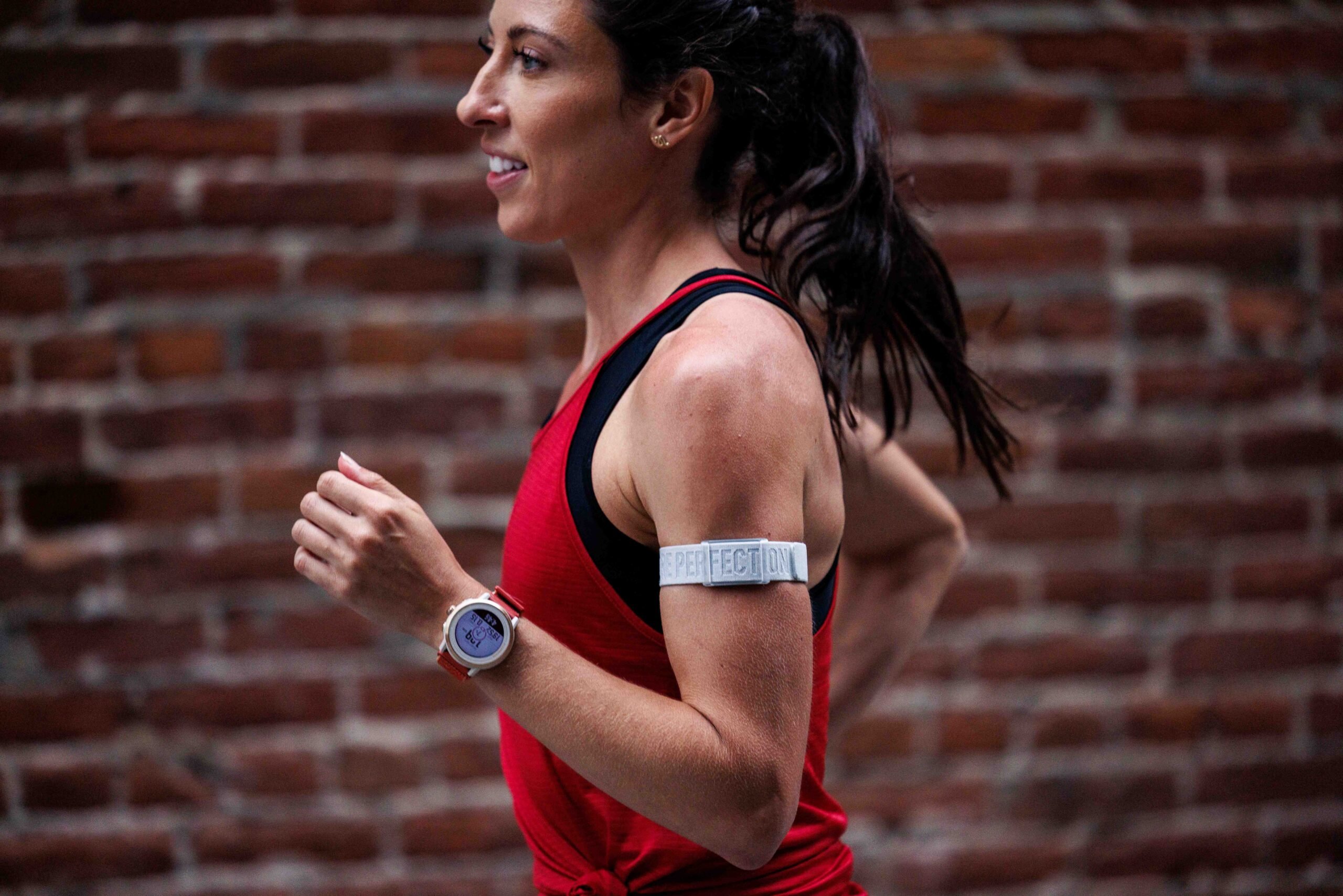
Advil has been cozying up to the running community, throwing money at influencers to make ibuprofen seem like a staple of every runner’s post-workout routine. You know, because nothing screams “peak athletic performance” like popping a painkiller after every run.
By tapping into social media personalities in the running and fitness space, Advil is positioning itself as a go-to solution for aches and pains. But beyond the sleek Instagram reels and enthusiastic endorsements, there’s a hefty dose of ethical and health concerns lurking in the background.
We’re talking misinformation, potential long-term health risks, and the overall sketchiness of pushing medication that could potentially be harmful to an audience that might not fully understand what they’re signing up for.
So let’s break down who’s involved, why this campaign is a problem, and what science actually says about using NSAIDs for running recovery.
Which Influencers Are Promoting Advil?
MaKayla Bassi (@fitbymakayla)
MaKayla Bassi, who is according to our website and social channels, a “hybrid athlete and running coach” based in Austin, Texas, juggling strength training and endurance sports. She’s built a strong following by chronicling her marathon training—most recently her prep for the Boston Marathon. According to her site, she has run four half marathons and two full marathons. She also sells her “Fit By MacKayla hybrid half marathon” training plan online for $500 USD.
Enter Advil. In a recent sponsored post, Bassi raved about how ibuprofen helped her power through soreness and fatigue, making it an “essential” part of her race prep. The problem? Encouraging runners to pop Advil as a routine part of training completely ignores the fact that pain is usually a signal that something needs attention—not a cue to reach for a pill bottle.
And the runners of the world were quick to call her out…

Dr. Lia (@dr.lia)
Dr. Lia, (real name Amelia Cruz) is a New York based influencer who brands herself as a “doctor of physical therapy, graduate professor, travel roller skater and lifestyle content creator,” dishes out advice on injury prevention and performance optimization on Instagram and TikTok. She teamed up with Advil to promote their Targeted Relief topical pain reliever, pitching it as a must-have for keeping an active lifestyle pain-free.
Sounds harmless enough, right? The catch is that positioning a medicated product as an everyday necessity subtly reinforces the idea that aches and pains should be numbed rather than addressed with proper recovery techniques. No mention of mobility work, strength imbalances, or smart training modifications—just slap on some Advil and keep moving.
Amy Haas (@raceacrossthestates)
Amy Haas, who refers to herself as a strength and running coach, posts regularly about blending strength work with endurance training. Recently, she posted that she always keeps Advil Liqui-Gels in her race-day kit, you know, just in case.
What she didn’t mention? Mid-race ibuprofen use is linked to some pretty gnarly risks—think kidney stress, gastrointestinal distress, and potentially serious complications if dehydration is already in play. Normalizing the idea that runners should have NSAIDs on hand during races is a dangerous message to spread.
After receiving some negative comments, Amy Haas made an edit to her original post to include a note, advising against taking Advil while running:

We reached out to Amy seeking more context and background on the partnership, here’s what she had to say.
Why did you decide to partner with Advil?
I decided to partner with them because when taken responsibly, it can help with relief from pain – especially headaches and menstrual cramps for me personally!
Was it a representative from Haleon, Advil’s parent company, Advil or an agency that first approached you?
It was a rep from Collectively I believe the name is.
Are you aware of the health risks involved in promoting using ibuprofen while running or exercising?
I am aware of the risks of taking it while or before running specifically & tried to stress this in my caption. I admittedly assumed people knew that they shouldn’t be taking it during exercise – but this is something I’ve become painfully aware isn’t something I can or should just assume.
Did the rep for Advil specify how the drug would be placed in your post?
Yes there was a brief with guidelines.
How were you compensated?
I was personally paid a flat rate.
Team Epiphany (@teamepiphany)
Not an individual influencer, but worth mentioning. Team Epiphany is a marketing agency that helps brands push products through influencer partnerships. They orchestrated an Advil influencer seeding program, where handpicked athletes and fitness personalities received free Advil kits to promote.
Why is this shady? Because it creates an illusion of authenticity. Followers see their favorite runners casually mentioning Advil without realizing they were handed a free box and a paycheck to do so.
The Ethical Issues with Advil’s Running Campaign
Encouraging Painkiller Dependency
Nothing like a little corporate-backed habit-forming behavior. Normalizing painkiller use for training and racing means runners might start treating ibuprofen like a performance enhancer, when in reality, it’s masking symptoms their bodies actually need them to pay attention to.
Lack of Full Disclosure on Risks
Here’s the deal: NSAIDs come with baggage. We’re talking increased risks of gastrointestinal bleeding, kidney issues (especially if you’re dehydrated), and potential interference with muscle recovery. But you wouldn’t know that from scrolling through your favorite influencer’s feed, because those risks tend to get conveniently left out of their enthusiastic endorsements.
Misleading Messaging About Recovery
Recovery isn’t something you shortcut with a pill. It’s built on sleep, proper nutrition, hydration, and mobility work. The idea that popping Advil is some kind of “recovery hack” is completely misleading, making runners believe they’re taking care of their bodies when they’re actually just masking symptoms.
Lack of FDA Oversight on Influencer Marketing
Here’s a fun fact: Unlike traditional pharmaceutical ads, which have to include side effect disclaimers, influencer marketing exists in a gray area. Brands like Advil can pay people to hype up their products without having to play by the same transparency rules as TV commercials. That means followers are getting a one-sided sales pitch disguised as an “authentic” personal experience.
The Science Behind NSAID Use in Running
The Role of Inflammation in Recovery
Inflammation isn’t your enemy—it’s part of how your body repairs itself. When you exercise, especially during endurance events, you create micro-tears in your muscles. This triggers an inflammatory response, sending blood, nutrients, and repair cells to the area. Studies have shown that taking NSAIDs like Advil interrupts this process, potentially slowing down muscle recovery and adaptation. Instead of letting your body get stronger naturally, you’re essentially short-circuiting the system.
The Impact on Kidney Function
Endurance athletes, particularly those running marathons and ultras, are already at risk of kidney damage due to dehydration and exertional stress. NSAIDs compound this risk by reducing blood flow to the kidneys, increasing the likelihood of acute kidney injury. A study in Medicine & Science in Sports & Exercise found that ultra-endurance athletes who took ibuprofen had significantly higher biomarkers of acute kidney injury than those who didn’t.
Increased Risk of Stress Fractures
NSAIDs don’t just interfere with muscle recovery—they also impair bone healing. A study published in Bone found that NSAIDs inhibit bone formation and delay healing, increasing the risk of stress fractures in athletes who rely on them frequently. Given that stress fractures are already a major concern for endurance runners, masking pain with NSAIDs can lead to more severe injuries down the road.
NSAIDs and Performance: Do They Actually Help?
Contrary to what marketing suggests, NSAIDs don’t enhance performance. A 2024 study in the Journal of Science and Medicine in Sport found that ibuprofen doesn’t prevent muscle soreness or improve performance in endurance athletes. In other words, you’re taking on risks without reaping any actual rewards.
At the end of the day, Advil’s influencer marketing campaign isn’t about helping runners recover—it’s about selling painkillers. Encouraging casual NSAID use, especially without full disclosure of the risks, is an ethically questionable move that could lead runners down a dangerous path of reliance.
Pain isn’t something to be masked; it’s something to be understood and addressed. Proper recovery is built on smart training, rest, and the occasional sports massage—not a handful of Advil.
MH has reached out to the above influencers for comment, and we’ll update this story as it unfolds.













I had to stop taking NSAIDs as they were causing ulcers (who knew?)! Very dangerous meds to take regularly and to promote this type of use is irresponsible.
Let’s not shame people. We are all doing our best and it’s our job to do the research before taking any medication. People can make mistakes and it’s not fair to call them out.
Hey there,
since publishing this story, we’ve head from multiple runners that they had taken Advil on runs after seeing this content, without being aware of the risks.
We stand by calling out influencers that plug popping Advils while running.
Thomas Watson
Marathon Handbook Founder